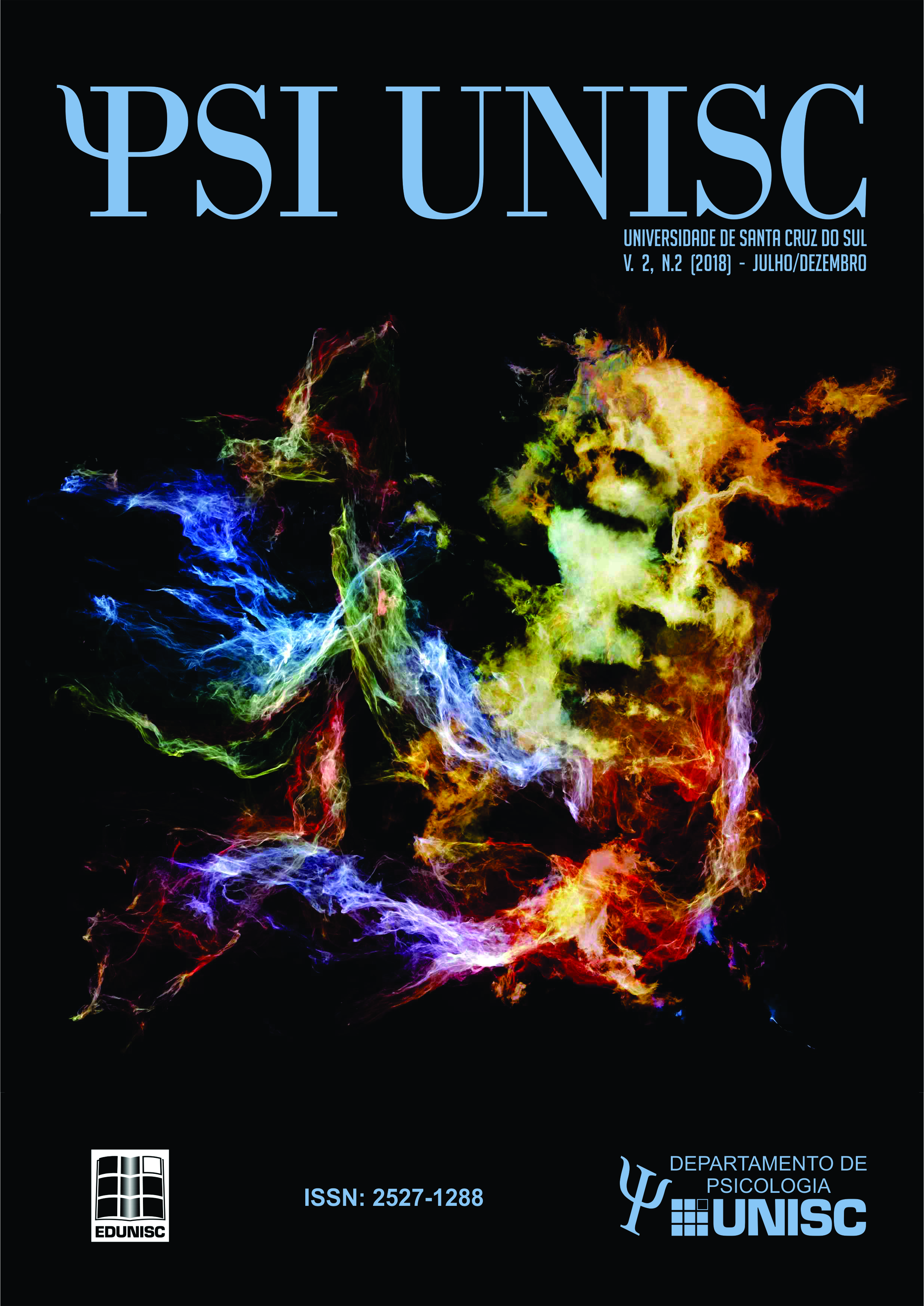Social Representations and Affirmative Actions: University Students and Their Positions
DOI:
https://doi.org/10.17058/psiunisc.v2i2.11904Keywords:
Quotas, Social representations, Attitudinal field.Abstract
Affirmative action policies have assumed many forms in different countries, but have almost always caused debates and raised diverse positions in society. In Brazil, this type of policy is mainly marked by quota system or vacancies reservation in competitions and selective processes for certain minorities. This work fits within social psychology, focusing on the theoretical field of social representations. Its purpose is to understand how the social thinking of quota and non-quota students is related to the quota system for admission to university. In order to achieve this purpose, a questionnaire was used, which contained questions in a free evocation format with the term "quotas" and questions in the form of Likert items in order to ascertain the position of the subjects in relation to different types of quotas. This instrument was applied to 135 students of State University of Rio de Janeiro, among them 63 are quotaholders and 72 are non-quota holders. The analyzes of these data were made through the techniques of prototypical analysis and similitude analysis. The results show a accentuated difference of the social representations and the affective field when comparing the two groups, which may justify the emergence of diverse and contradictory arguments about quotas in society.Downloads
References
Abric, J.C. (1994). Pratiques Sociales et Representations. Paris: Presses Universitaires de France.
Abric, J.C. (2003). A abordagem estrutural das representações sociais: desenvolvimentos recentes. In Campos, P. H. F., & Loureiro, M. C. S. (orgs.). Representações sociais e práticas educativas (pp. 37-57). Goiânia: Ed. UCG.
Bolívar, A. (2005) Equidad educativa y teorías de la justicia. REICE - Revista Electrónica Iberoamericana sobre Calidad, Eficacia y Cambio en Educación, 3 (2), 1-29.
Bourdieu, Pierre. La noblesse d’État: grandes écoles et esprit de corps. Paris: Minuit, 1989.
Dubet, F. (2009). Le travail des sociétés. Paris: Seuil.
Flament, C. (1994) Structure, dynamique et transformation des représentations sociales. In Abric, J.C. (Ed.), Pratiques sociales et representations (pp. 37-57). Paris, PUF.
Frias, L. (2012) As cotas raciais e sociais em universidades públicas são injustas? Direito, Estado e Sociedade, 41, 130-156.
Guimarães, A. S. A. (2003). Acesso de negro às Universidades Públicas. Cadernos de Pesquisa, 118, 247-268,
Guimelli, C. (1994). Structures et transformations des représentations sociales. França : Delachaux et Niestlé.
Guzzo, R. S. L., & Filho, A. E. (2005). Desigualdade social e sistema educacional brasileiro: a urgência da educação emancipadora. Escritos sobre Educação, 4(2), 39-48.
Jodelet, D. (1989). Représentations sociales: un domaine en expansion. Paris: PUF.
Junior, M., & Ferreira, A. A. (2014). Uma análise da progressão dos alunos cotistas sob a primeira ação afirmativa brasileira no ensino superior: o caso da Universidade do Estado do Rio de Janeiro. Ensaio: Avaliação e Políticas Públicas em Educação, 22(82), 31-56.
Likert, R. (1932) A technique for the measurement of attitudes. Archives of Psychology. 140, 44-53.
Marques, T., & Santos, B. K. A. (2015) Um estudo sobre o pensamento social de jovens universitários acerca da justiça e das cotas raciais. Revista Psicologia & Saber Social, 4 (1), 108-125. doi: 10.12957/psi.saber.soc.2015.17559
Moehlecke, S. (2002). Ação afirmativa: história e debates no Brasil. Cadernos de Pesquisa, 117, 197-218. doi: 10.1590/S0100-15742002000300011
Moliner, P. (1989). Validation expérimentale de l’hypothèse du noyau central des représentations sociales. Bulletin de Psychologie, (42), 759-762.
Moreno, J. P. (2009). Conceito de minorias e discriminação. Revista USCS , 10 (17), 141-156.
Moscovici, Serge. (2003). Representações sociais: investigações em psicologia social. Rio de Janeiro: Vozes.
Moscovici, Serge. (2011). Psicologia das minorias ativas. Petrópolis, RJ: Vozes.
OECD. (2017) PISA 2015 Results (Volume V): Collaborative Problem Solving. Paris: OECD Publishing.
Oliveira, D. C., & Marques, S. C., & Gomes, A. M. T., & Teixeira, M. C. T. V., & Amaral, M. A. D. (2005). Análise das evocações livres: uma técnica de análise estrutural das representações sociais. In Moreira, A.S.P., & Camargo B. V., & Jesuíno, J. C., & Nóbrega (Orgs.). Perspectivas teórico-metodológicas em representações sociais (pp.573-603). João Pessoa: Editora Universitária da UFPB.
Picanço, F. (2015). Juventude por cor e renda no acesso ao ensino superior: somando desvantagens, multiplicando desigualdades?. Revista Brasileira de Ciências Sociais, 30 (88), 145-181. doi: 10.17666/3088145-179/2015.
Queiroz, D. M., & Santos, J. T. (2006) Sistema de cotas: um debate. Dos dados à manutenção de privilégios e de poder. Educ. Soc., 27 (96). doi: S0101-73302006000300005
Sá, C. P. (2002) A teoria do núcleo central das representações sociais (cap. 2). In Sá, C.P. Núcleo central das representações sociais (pp. 51-98). Petrópolis: Vozes.
Sá, C. P. (2015) Estudos de Psicologia social. Rio de Janeiro: Eduerj.
Valle, I. R., & Ruschel, E. (2009). A meritocracia na política educacional brasileira (1930-2000). Revista Portuguesa de Educação, 22(1), 179-206.
Valle, I. R. (2013) (In)Justiça escolar: estaria em xeque a concepção clássica de democratização da educação?. Educ. Pesqui., 39(3), 1-13
Vergès, P. (1992) Programas informáticos para análise de semelhanças e evocações. Aix en Provence: LAMES-CNRS.
Vergés, P.; & Guimelli, C. (1994). Approche du noyau central: propriétés quantitatives et structurales. In Guimelli, C. (orgs.). Structures et transformations des représentations sociales. França : Delachaux et Niestlé.
Wachelke, J. F. R., & Wolter, R. P. (2011). Critérios de construção e relato da análise prototípica para representações sociais. Psicologia: Teoria e Pesquisa, 27,521-526. doi:10.1590/S010237722011000400017
Wolter, R. P., & Gurrieri, C., & Sorribas, E. (2009). Empirical illustration of the hierarchical organisation of social thought: a domino effect?. Interamerican Journal of Psychology, 43, 1-11.
Wolter, R. P., & Wachelke, J. F. R. (2013). Índices de distribuição de evocações: Raridade, diversidade e comunidade de corpora de representações sociais. Revista de Psicologia: Teoria e Prática, 15, 119-129.
Wolter, R. P., Wachelke, J., & Naiff, D. (2016). A abordagem estrutural das representações sociais e o modelo dos esquemas cognitivos de base: perspectivas teóricas e utilização empírica. Temas em Psicologia, 24(3), 1139-1152. doi : 10.9788/TP2016.3-18
Downloads
Published
How to Cite
Issue
Section
License
The submission of originals to this journal implies the transfer, by the authors, of the printed and digital publication rights. The copyrights for the published articles are those of the author, with periodical rights on the first publication. Authors may only use the same results in other publications clearly indicating this journal as the medium of the original publication. Because we are an open access journal, we allow free use of articles in educational and scientific applications provided the source is cited under the Creative Commons CC-BY license.




